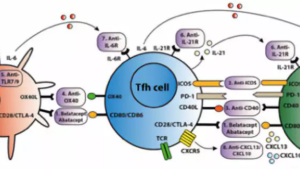
This is despite the fact that short-term graft survival after kidney transplantation has reached very high levels
But its long-term survival rate is still not satisfactory.
Ten years after kidney transplantation, nearly half of all transplants have lost function.

Is there a marker that can indicate or even predict the outcome of a kidney transplant so that early intervention can be taken to prolong the graft’s survival?
It’s a question that transplant specialists and patients around the world are desperate to know the answer to.
Dr. Zhu told us today:
Transitional B cells may serve as a new prognostic indicator in renal transplantation
In the latest study on“Transition B cells”:
Transition B cells expressed higher levels of anti-inflammatory factor IL-10 and lower levels of pro-inflammatory factor TNF-a.
IL-10
It plays an important role in many diseases such as autoimmune diseases, severe infectious diseases, tumors and transplantation immunity.
TNF-a
It plays an important role in growth regulation, differentiation, inflammatory response, viral replication, tumorigenesis, autoimmune diseases, and viral, bacterial, fungal, and parasitic infections.
This property makes it possible for transitional B cells to have immunomodulatory effects.
A team of researchers from the U.S. and the U.K. found that T1 cells express higher levels of IL-10 and lower levels of TNF-a than T2 cells, two types of transitional B cells.
They followed 45 patients who underwent renal allograft biopsy due to elevated serum creatinine for 5 years. They found that patients with a low T1/T2 ratio had significantly worse allograft survival after 5 years of follow-up than patients with a high T1/T2 ratio, this index is an independent prognostic factor for renal allografts.
To test the results, they did the same study with another group of 97 patients with stable kidney transplant function and found that the T1/T2 ratio was also a very strong predictor of outcome in patients with stable kidney transplant function.
Although more validation is needed, this study suggests that the T 1/T 2 ratio can be used as an indicator of graft survival and as a reference for individualized regulation of immunosuppressive agents in kidney transplant patients.

The kidney transplantation center of Zhongshan Hospital affiliated to Fudan University has a long history of kidney transplantation and successfully performed the first kidney transplantation in children with Denys DRASH syndrome in China.
Together with the Shanghai China Soong Ching Ling Foundation, we have established the“Kidnewer” children’s kidney transplant charity project to provide charitable assistance to families of children with kidney transplants who are in financial difficulty.

We will join hands with you to relieve the suffering of uremia patients.
Wen | Zhu Dong, editor | Wang Jina
This article is the original article of“Kidney Transplantation in Zhongshan Hospital of Fudan University”, reprinted with the author’s permission and marked the source. Care about the kidney, from the concern“Fudan University affiliated Zhongshan Hospital Kidney Transplant” public wechat start, you can also click [ read the original ] , view“药物浓度影响治疗效果,我们该如何控制浓度?”。




